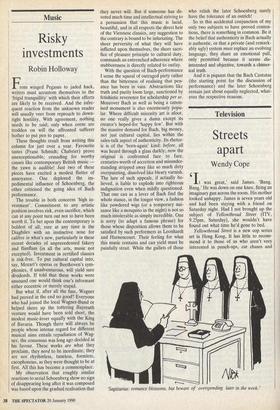Music
Risky investments
Robin Holloway
From winged Pegasus to jaded hack, writers must accustom themselves to the `frigid tranquillity' with which their efforts are likely to be received. And the infre- quent reaction from the unknown reader will usually veer from reproach to down- right hostility. With agreement, nothing needs to be said., only when corns are trodden on will the affronted sufferer bother to put pen to paper.
These thoughts result from writing this column for just over a year. Favourite tastes (Franz Schmidt; Chabrier) prove unexceptionable; crusading for worthy causes like contemporary British music the yawn is audible! Just two of these pieces have excited a modest flutter of annoyance. One deplored the im- pedimental influence of Schoenberg, the other criticised the going idea of Bach performance.
The trouble in both concerns 'high in- vestment'. Commitment to any artistic position involves risk, even sacrifice, which can at any point turn out not to have been worth it. To bet upon the contemporary is boldest of all; rare at any time is the Diaghilev with an instinctive nose for calibre in what's new, particularly in these recent decades of unprecedented fakery and flimflam (in all the arts, music not excepted). Investment in certified classics is risk-free. To put cultural capital into, say, Mozart's operas or Beethoven's sym- phonies, if unadventurous, will yield sure dividends. If told that these works were unsound one would think one's informant either eccentric or merely stupid.
But what if, after all the fuss, Wagner had proved in the end no good? Everyone who had joined the local Wagner-Bund or helped shore up the tottering Bayreuth venture would have been sold short, the modest music-lover equally with the King of Bavaria. Though there will always be people whose intense regard for different musical aims entails repudiation of Wag- ner, the consensus was long ago decided in his favour. These works are what they proclaim, they need to be inordinate; they are not rhythmless, tuneless, formless, cacophonous, as they were thought to be at first. All this has become a commonplace.
My observation that roughly similar reactions to serial Schoenberg show no sign of disappearing long after it was composed was based upon the gradual realisation that they never will. But if someone has de- voted much time and intellectual striving to a persuasion that this music is lucid, beautiful, and in all respects the direct heir of the Viennese classics, any suggestion to the contrary is bound to be infuriating. The sheer perversity of what they will have inflicted upon themselves, the sheer sacri- fice of pleasure principle to cultural duty, commands an entrenched adherence where stubbornness is directly related to outlay.
With the question of Bach-performance I sense the squeal of outraged piety rather than the bitterness of realising that pen- ance has been in vain. Abstractions like truth and purity loom large, sanctioned by fetishistic reverence for scholarship per se. Moreover Bach as well as being a canon- ised monument is also enormously popu- lar. Where difficult minority art is afoot, no one really gives a damn except its creator's hoped-for 'happy few'. But with the massive demand for Bach, big money, not just cultural capital, lies within the sales-talk aspect of authenticity. Its rhetor- ic is of the 'born-again' kind: before, all was heard through a glass darkly; now the original is confronted face to face, centuries-worth of accretion and misunder- standing stripped away like so much dirty overpainting, dissolved like bleary varnish. The lure of such appeals, if actually be- lieved, is liable to explode into righteous indignation even when mildly questioned. That one can as a lover of Bach find the whole stance, in the longer view, a fashion like powdered wigs (or a temporary nui- sance like a mosquito in the night) is not so much intolerable as simply incredible. One is sorry (to adapt a famous phrase) for those whose disposition allows them to be satisfied by such performers as Leonhardt and Harnencourt. Their feeling for what this music contains and can yield must be painfully strait. While the gullets of those
who relish the later Schoenberg surely have the tolerance of an ostrich!
So in this accidental conjunction of my only two subjects to have proved conten- tious, there is something in common. Be it the belief that authenticity in Bach actually is authentic, or that a private (and remark- ably ugly) system must replace an evolving language, they share an emotional pull, only permitted because it seems dis- interested and objective, towards a chimer- ical truth.
And it is piquant that the Bach Cantatas (the starting point fgt. the discussion of performance) and the later Schoenberg remain just about equally neglected, what- ever the respective reasons.


















































 Previous page
Previous page